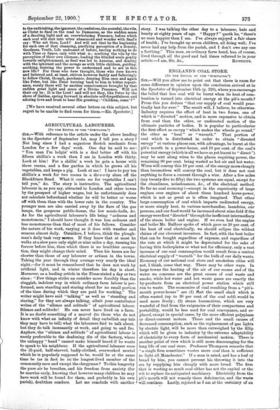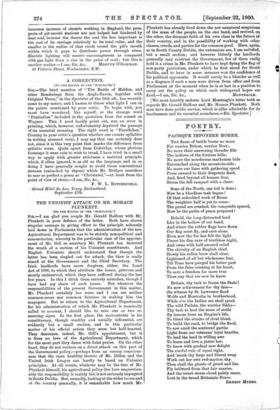ENGLAND'S COAL STORE.
[To THE EDITOR OP THE " SPECTATOR."]
Sru,—Will you allow me to point out that there is room for some difference in opinion upon the conclusion arrived at in the Spectator of September 15th (p. 328), where you encourage the belief that less coal will be burnt when its beat of com- bustion is turned into electrical energy at the pit's mouth P From this you deduce "that our supply of coal would prac- tically last for ever." The result will, I believe, be otherwise. Industry requires the effect of heat in two forms, one of which is " directed " motion, and is more expensive to obtain from coal than the other, or undirected motion of the ultimate particles of bodies. It is popular to particularise the first effect as energy "which makes the wheels go round," the other as " heat " or "warmth." That portion of coal which is distributed in order to obtain "directed energy" at various places can, with advantage, be burnt at the pit's mouth in a power-house, and 10 per cent, of the coal's potential energy (which is all we have as yet learnt to " direct ") may be sent along wires to the places requiring power, the remaining 90 per cent. being wasted as hot air and hot water. Wires will convey this 10 per cent. of the energy more cheaply than locomotives will convey the coal, but it does not cost anything to force a current through a wire. After a few miles (say twenty-five to fifty) the two systems are equal, except for the cleanliness, noiselessness, &c., of the electrical method. So far no coal economy !—except in the superiority of large engines over engines of about three hundred horse-power, which is not as great as is often imagined. That other large consumption of• coal which imparts undirected energy, or more simply heat, to various merchandise, laundries, our persons, and our food would be increased about nine-fold if the energy were first" directed " through the inefficient intermediary of the steam boiler and engine. If we even had the engine and boiler Mr. Balfour spoke of which gave us 20 per cent. of the heat of coal electrically, we should eclipse the wildest claims of our cleverest inventors. In fact, with the best boiler that can be bought regardless of expense, and regardless of the rate at which it might be depreciated for the sake of having thin boilerplates or what not for efficiency, only a vast increase of our coal consumption would result from a central electrical supply of " warmth " for the bulk of our daily wants. Economy of our national coal store and smokeless cities will not, I think, come that way. There may be other ways. In large towns the heating of the air of our rooms and of the water we consume are the great causes of coal waste and smoke, while hot water and hot waste gases are exactly the by-products from an electrical power station which still run to waste. The economies of coal resulting from a "pit's- mouth power-house" are (1) that the small slack which is often wasted (up to 30 per cent, of the coal sold) would be used more freely ; (2) steam locomotives, which are very wasteful of fuel from the exigencies of their compactness and portability, would be less used for coal conveyance, and re- placed, except in special cases, by the more efficient polyphase or direct-current motors. These and the small causes of decreased consumption, such as the replacement of gas lights by electric light, will be more than outweighed by the fillip which will be given to industry by the extreme adaptability of electricity to every form of mechanical motion. There is another point of view which is still more discouraging for the long life of our coal store. Professor Thompson remarks that "a single firm sometimes wastes more coal than is sufficient to light all Manchester." If a man is sated, and has a loaf of bread by him, you cannot prevent his throwing it into the sea by supplying him cheaply with more bread. The firm that is wasting so much coal either has not the capital or the wit to replace its antiquated machinery. Electricity from the pit's mouth will not remedy these deficiencies, and the waste will continue. Lastly, rejoiced as I am at the certainty of an
immense increase of electric working in Fngland, the pros- pects of pit-mouth stations are not lxelped but hindered by dear coal, because the dearer the coal the less important is the cost of its carriage relatively to it total value, and the smaller is the radius of that circle round the pit's mouth within which it pays to distribute power through wires. Electric lighting will receive encouragement as compared with gas light from a rise in the price of coal; but this is







































 Previous page
Previous page